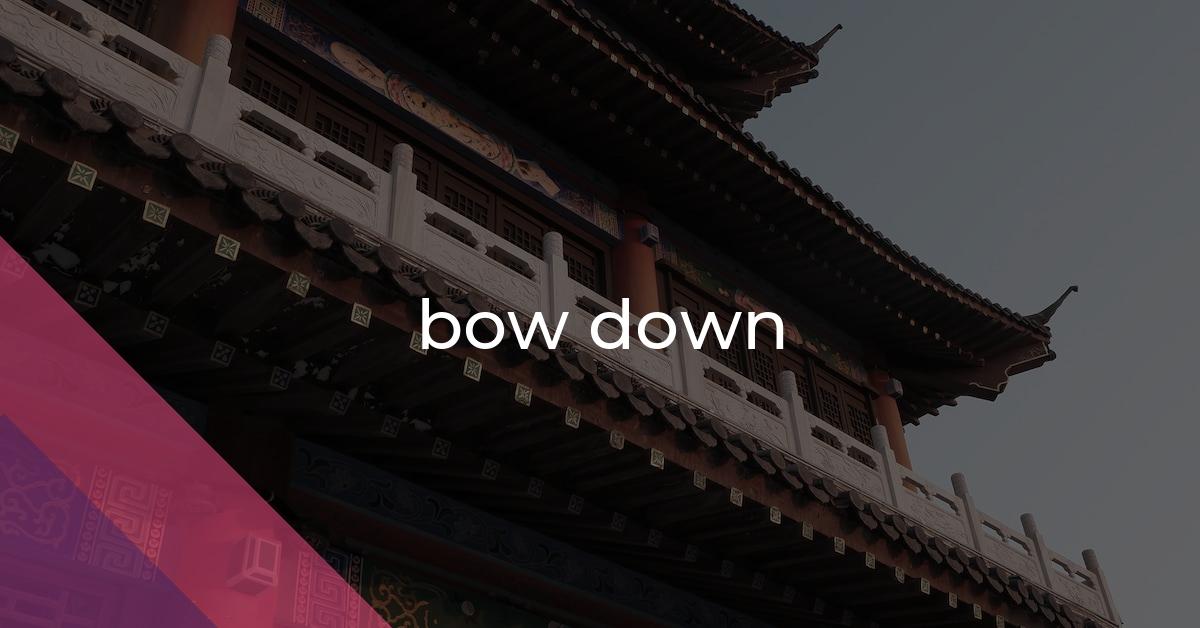bow down: Idiom Meaning and Origin
What does ‘bow down’ mean?
The idiom "bow down" means to show great respect or submission to someone or something.

Idiom Explorer
The idiom "take a bow" means to receive recognition or applause for one's achievements or performance. It is often used when someone has done something well and is being acknowledged by others.
The idiom "knock down a peg" means to humble or deflate someone's ego or pride. It is used when someone's self-importance or arrogance needs to be brought down to a more reasonable level.
The idiom "knock down" means to forcefully bring someone or something to the ground. It can also refer to reducing the price or value of something significantly.
The idiom "hat in hand" means to be humble or submissive, often after a failure or when seeking forgiveness or help.
The idiom "hang low" means to appear sad or dejected, often with drooping body posture or a downcast expression.
The idiom "go to the bow-wows" means to deteriorate or decline in a significant way.
The idiom "go down on" is a colloquial expression that typically refers to performing oral sex on someone. It is important to note that this idiom is considered vulgar and explicit in nature.
The idiom "fall in line" means to conform or comply with rules or expectations. It implies following a prescribed order or obeying authority.
Origins Unveiled
The idiom "bow down" is commonly used in English to convey the idea of showing submission or reverence to someone or something. This expression originated in ancient times when bowing down was a gesture of respect and obedience.
Across many cultures, bowing down is seen as a sign of deference and respect towards a person of higher status or authority. It is a physical act that symbolizes humility and subservience, as individuals lower their heads or bodies to acknowledge another person's superiority or power.
This idiom can also be used figuratively, without involving a physical action. In this context, "bowing down" refers to acknowledging or admitting someone's dominance or superiority in a certain area. It describes a situation where someone is willing to concede or yield to another person's expertise, skill, or authority.
Furthermore, "bowing down" can be interpreted as a sign of worship or adoration towards a deity or religious figure. Within religious contexts, bowing down is often performed as an act of devotion, expressing reverence and submission to a higher power.
The related idiom "bow and scrape" is used to describe an exaggerated display of subservience or flattery towards someone in a position of authority. It implies that the person is not only bowing down but also scraping the ground with their body to show extreme humility and deference.
"bend the knee" is another idiom related to "bow down." It originates from the act of kneeling, which is seen as a gesture of submission. This idiom often carries a connotation of surrendering to a higher authority or giving up one's power or position.
"take a bow" is a phrase used to acknowledge and accept recognition or applause for one's achievements or performance. It originates from the practice of actors, performers, or speakers taking a bow at the end of a performance to show gratitude for the audience's appreciation.
The idiom "bow down" encompasses the concepts of respect, deference, submission, and admiration. It signifies a willingness to acknowledge someone's authority or superior qualities, whether in a literal or figurative sense. By using this idiom, speakers can convey their recognition of another person's power, knowledge, or position.
It is important to note that language is constantly evolving, and the interpretation and usage of idioms can change over time and across different cultures. While the origins and general meaning of the idiom "bow down" are well-established, there may be subtle nuances or additional connotations associated with this expression that have not been fully explored or documented.
Example usage
Examples of how the idiom *bow down* can be used in a sentence:
- She refused to bow down to peer pressure and stuck to her own beliefs.
- The tyrant demanded that his subjects bow down before him as a sign of their obedience.
- They were so impressed by her achievements that they metaphorically bowed down to acknowledge her greatness.
More "Respect" idioms



